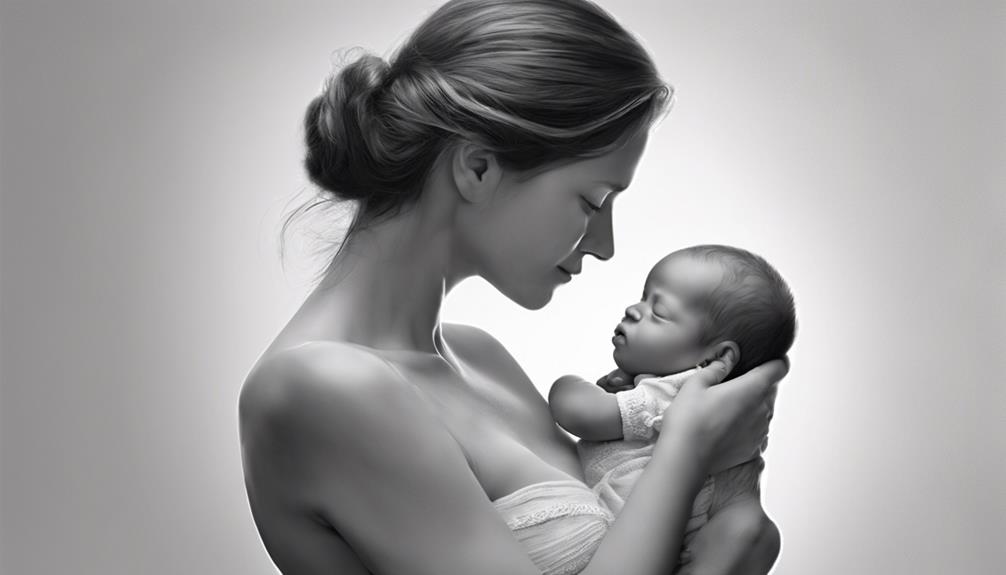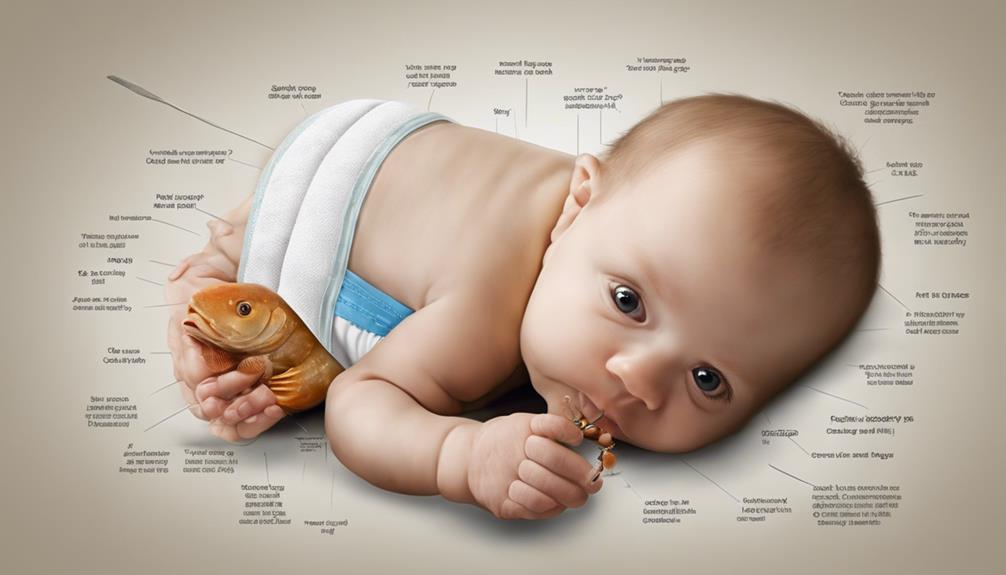If you have ever witnessed your baby fight with hiccups, you understand how upsetting it can be.
But fear not, there are practical steps you can take to ease their discomfort and help them find relief.
By exploring gentle techniques and understanding the underlying causes, you can empower yourself to support your little one through these episodes.
Stay tuned to uncover effective strategies that can make a difference for both you and your baby.
Key Takeaways
- Gently soothe hiccups with back rubs and pacifiers.
- Adjust feeding techniques to reduce air intake and aid digestion.
- Maintain upright positioning post-feeding for 30 minutes.
- Consult healthcare providers for persistent or disruptive hiccups.
Understanding Newborn Hiccups
If your newborn is experiencing hiccups, it's important to understand that these are caused by involuntary contractions of the diaphragm muscle. Hiccups in babies, including preemies, are quite common and usually harmless. These little episodes can occur several times a day, especially after feeding. For premature babies, hiccupping can play a role in regulating their breathing, so it's not all bad news.
When it comes to triggers for these hiccups, factors like excess milk intake, feeding speed, and swallowing air during feeds can often be the culprits. As a caring parent, being mindful of these triggers can help reduce the frequency of your baby's hiccups. Bear in mind, these occurrences are a part of your baby's development and are typically nothing to worry about. Keep an eye on your little one, comfort them during these episodes, and know that in most cases, hiccups will pass on their own.
Identifying Causes of Hiccups

To further understand why your newborn is experiencing hiccups, let's explore the various triggers that can lead to these involuntary contractions of the diaphragm muscle:
- Excess Air Swallowing: Babies tend to swallow air during feeding, which can irritate the diaphragm and result in hiccups.
- Feeding Speed: Rapid feeding can lead to your baby ingesting more air, causing hiccups as the diaphragm contracts involuntarily.
- Immature Digestive System: Your baby's digestive system is still developing, making it more prone to hiccups after feedings.
- Breathing Regulation: Hiccuping in newborns is a natural process that helps regulate breathing, especially since babies practice breathing movements in the womb.
- Preemies: Preterm babies often experience more hiccups as they use this reflex to expel air and improve their breathing patterns.
Understanding these causes can help you navigate your baby's hiccups with more confidence and care.
Implementing Simple Soothing Techniques

When comforting a newborn with hiccups, gently rubbing their back can effectively relax the diaphragm and halt the involuntary contractions. This simple technique can provide comfort and help alleviate the discomfort caused by baby hiccups.
Additionally, offering a pacifier to your baby may serve as a soothing distraction, easing the hiccups and providing a sense of security. Remember to burp your baby frequently during and after feedings to release any trapped air, which can contribute to hiccups.
Keeping your baby upright for approximately 30 minutes after feeding can aid in digestion and reduce the chances of hiccups occurring. Additionally, adjusting the feeding position or pace can help prevent hiccups by minimizing the intake of excess air.
Trying Effective Positioning Methods

Consider positioning your baby in a slightly upright stance during and after feedings to help minimize the occurrence of hiccups. This simple adjustment can make a significant difference in preventing your baby's discomfort.
To further assist you in this process, here are some effective positioning methods to incorporate into your baby's feeding routine:
- Support the Head: By supporting your baby's head and neck during feeding, you can encourage proper swallowing and digestion, reducing the risk of hiccups.
- Create a Calm Environment: Avoid distractions and create a peaceful feeding atmosphere to promote smoother digestion and decrease the likelihood of hiccups.
- Ensure Comfort: Keeping your baby relaxed and comfortable during feeding can lead to a more peaceful feeding experience and help prevent hiccups.
- Good Latch: Ensuring a good latch while breastfeeding can aid in proper feeding and digestion, which can help stop hiccups from occurring.
- Feed on Schedule: Establishing a consistent feeding schedule can also contribute to minimizing hiccups by allowing your baby's body to adapt and relax their diaphragm.
Incorporating these practices into your baby's routine can help prevent and alleviate hiccups, providing a more comfortable experience for your little one.
Consulting a Healthcare Professional

If your newborn continues to experience persistent hiccups or displays any worrisome symptoms, seeking guidance from a healthcare professional is recommended.
Healthcare professionals can offer valuable insight into managing and effectively addressing your baby's hiccups. They've the expertise to assess your baby's overall health status and determine if there are any underlying issues contributing to the hiccups.
It's crucial to consult a healthcare professional if the hiccups interfere with your baby's feeding or sleep patterns. By seeking medical advice, you can receive personalized recommendations and interventions tailored to your baby's specific needs.
Frequently Asked Questions
How Do I Relieve My Newborns Hiccups?
To relieve your newborn's hiccups, try burping them frequently during feedings, offering a pacifier for relaxation, adjusting their feeding position, and gently rubbing their back. Avoid adult remedies and focus on gentle methods for relief.
Is It OK to Leave Baby Lying Down With Hiccups?
It's safe to let your baby lie down with hiccups. They're usually harmless and resolve on their own. As long as your baby is comfortable and not distressed, it's okay. Monitor them and seek help if needed.
What Is the Best Position for Baby Hiccups?
To help your newborn with hiccups, hold them upright against your chest or sit them on your lap. After feeding, keep them upright for 30 minutes. Gently pat or rub their back. Avoid laying them flat right after eating.
How to Get Rid of Hiccups Fast?
To get rid of hiccups fast, try gentle patting on the back, offering a pacifier, burping frequently, adjusting feeding positions, and avoiding overfeeding. These simple steps can help your baby find relief quickly and comfortably.
Conclusion
You now have the tools to tackle those pesky newborn hiccups with confidence.
By understanding the causes, implementing soothing techniques, and trying different positions, you can ease your baby's discomfort.
Remember, seeking advice from a healthcare professional is always a smart move if hiccups persist.
With these simple steps, you'll be able to navigate this common challenge like a pro and guarantee your baby stays happy and healthy.









